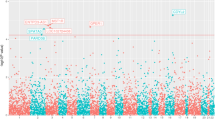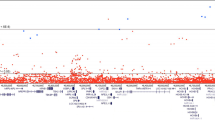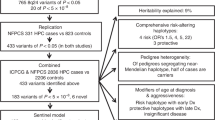Abstract
Deletions on human chromosome 8p22–23 in prostate cancer cells1 and linkage studies in families affected with hereditary prostate cancer (HPC)2,3,4 have implicated this region in the development of prostate cancer. The macrophage scavenger receptor 1 gene (MSR1, also known as SR-A) is located at 8p22 and functions in several processes proposed to be relevant to prostate carcinogenesis5,6,7,8,9,10. Here we report the results of genetic analyses that indicate that mutations in MSR1 may be associated with risk of prostate cancer. Among families affected with HPC, we identified six rare missense mutations and one nonsense mutation in MSR1. A family-based linkage and association test indicated that these mutations co-segregate with prostate cancer (P = 0.0007). In addition, among men of European descent, MSR1 mutations were detected in 4.4% of individuals affected with non-HPC as compared with 0.8% of unaffected men (P = 0.009). Among African American men, these values were 12.5% and 1.8%, respectively (P = 0.01). These results show that MSR1 may be important in susceptibility to prostate cancer in men of both African American and European descent.
This is a preview of subscription content, access via your institution
Access options
Subscribe to this journal
Receive 12 print issues and online access
$209.00 per year
only $17.42 per issue
Buy this article
- Purchase on Springer Link
- Instant access to full article PDF
Prices may be subject to local taxes which are calculated during checkout


Similar content being viewed by others
References
Latil, A. & Lidereau, R. Genetic aspects of prostate cancer. Virchows Arch. 432, 389–406 (1998).
Xu, J. et al. Linkage and association studies of prostate cancer susceptibility: evidence for linkage at 8p22–23. Am. J. Hum. Genet. 69, 341–350 (2001).
Gibbs, M. et al. A genomic scan of families with prostate cancer identifies multiple regions of interest. Am. J. Hum. Genet. 67, 100–109 (2000).
Goddard, K.A., Witte, J.S., Suarez, B.K., Catalona, W.J. & Olson, J.M. Model-free linkage analysis with covariates confirms linkage of prostate cancer to chromosomes 1 and 4. Am. J. Hum. Genet. 68, 1197–1206 (2001).
Platt, N. & Gordon, S. Is the class A macrophage scavenger receptor (SR-A) multifunctional?—The mouse's tale. J. Clin. Invest. 108, 649–654 (2001).
DeMarzo, A.M., Marchi, V.L., Epstein, J.I. & Nelson, W.G. Proliferative inflammatory atrophy of the prostate: implications for prostatic carcinogenesis. Am. J. Pathol. 155, 1985–1992 (1999).
Nelson, W.G., DeMarzo, A.M. & DeWeese, T.L. The molecular pathogenesis of prostate cancer: implications for prostate cancer prevention. Urology 57, 39–45 (2001).
Shimura, S. et al. Reduced infiltration of tumor-associated macrophages in human prostate cancer: association with cancer progression. Cancer Res. 60, 5857–5861 (2000).
Lissbrant, I.F. et al. Tumor-associated macrophages in human prostate cancer: relation to clinicopathological variables and survival. Int. J. Oncol. 17, 445–451 (2000).
Bova, G.S. et al. Homozygous deletion and frequent allelic loss of chromosome 8p22 loci in human prostate cancer. Cancer Res. 53, 3869–3873 (1993).
Laird, N.M., Horvath, S. & Xu, X. Implementing a unified approach to family-based tests of association. Genet. Epidemiol. 19 (Suppl. 1), S36–S42 (2000).
Xu, J. et al. Association studies of serum prostate-specific antigen levels and the genetic polymorphisms at the androgen receptor and prostate-specific antigen genes. Cancer Epidemiol. Biomarkers Prev. 11, 664–669 (2002).
Kodama, T. et al. Type I macrophage scavenger receptor contains alpha helical and collagen-like coiled domains. Nature 343, 531–535 (1990).
Wada, Y. et al. Structure and function of macrophage scavenger receptors. Ann. NY Acad. Sci. 748, 226–238 (1995).
Acton, S. et al. The collagenous domains of macrophage scavenger receptors and complement component C1q mediate their similar, but not identical, binding specificities for polyanionic ligands. J. Biol. Chem. 268, 3530–3537 (1993).
Dejager, S., Mietus-Snyder, M., Friera, A. & Pitas, R.E. Dominant negative mutations of the scavenger receptor. Native receptor inactivation by expression of truncated variants. J. Clin. Invest. 92, 894–902 (1993).
Frank, S., Lustig, A., Schulthess, T., Engel, J. & Kammerer, R.A. A distinct seven-residue trigger sequence is indispensable for proper coiled-coil formation of the human macrophage scavenger receptor oligomerization domain. J. Biol. Chem. 275, 11672–11677 (2000).
Mietus-Snyder, M., Glass, C.K. & Pitas, R.E. Transcriptional activation of scavenger receptor expression in human smooth muscle cells requires AP-1/c-Jun and C/EBPbeta: both AP-1 binding and JNK activation are induced by phorbol esters and oxidative stress. Arterioscler. Thromb. Vasc. Biol. 18, 1440–1449 (1998).
Suzuki, H. et al. A role for macrophage scavenger receptors in atherosclerosis and susceptibility to infection. Nature 386, 292–296 (1997).
Thomas, C.A. et al. Protection from lethal gram-positive infection by macrophage scavenger receptor-dependent phagocytosis. J. Exp. Med. 191, 147–156 (2000).
Strickler, H.D. & Goedert, J.J. Sexual behavior and evidence for an infectious cause of prostate cancer. Epidemiol. Rev. 23, 144–151 (2001).
Emi, M. et al. Structure, organization, and chromosomal mapping of the human macrophage scavenger receptor gene. J. Biol. Chem. 268, 2120–2125 (1993).
Tusnady, G.E. & Simon, I. The HMMTOP transmembrane topology prediction server. Bioinformatics 17, 849–850 (2001).
Krogh, A., Larsson, B., von Heijne, G. & Sonnhammer, E.L. Predicting transmembrane protein topology with a hidden Markov model: application to complete genomes. J. Mol. Biol. 305, 567–580 (2001).
Weir, B.S. Genetic Data Analysis II: Methods for Discrete Population Genetic Data (Sinauer, Sunderland, Massachusetts, 1996).
Kruglyak, L., Daly, M.J., Reeve-Daly, M.P. & Lander, E.S. Parametric and nonparametric linkage analysis: a unified multipoint approach. Am. J. Hum. Genet. 58, 1347–1363 (1996).
Smith, J.R. et al. Major susceptibility locus for prostate cancer on chromosome 1 suggested by a genome-wide search. Science 274, 1371–1374 (1996).
Ott, J. Analysis of Human Genetic Linkage 3rd edn (Johns Hopkins Press, Baltimore, Maryland, 1998).
Whittemore, A.S. & Halpern, J. Probability of gene identity by descent: computation and applications. Biometrics 50, 109–117 (1994).
Sasieni, P.D. From genotypes to genes: doubling the sample size. Biometrics 53, 1253–1261 (1997).
Acknowledgements
We thank all subjects for their participation; F. Torti for his support in recruiting study subjects at Wake Forest University School of Medicine; W. Catalona for measuring PSA concentrations in the asbestos study population; R. Gurganus, L. Mangold and D. Lamm for help in prostate cancer screenings; and J.L. Hicks for help with immunohistochemistry. This work was partially supported by US Public Health Service Prostate Cancer Specialized Programs of Research Excellence grant, grants from the US Department of Defense to W.B.I. and J.X., Association for the Cure of Cancer of the Prostate, the Fund for Research and Progress in Urology, Johns Hopkins University, Wake Forest Comprehensive Cancer Center and the William Thomas Gerrard, Mario Anthony Duhon, Jennifer and John Chalsty Professorship in Urology.
Author information
Authors and Affiliations
Corresponding author
Ethics declarations
Competing interests
The authors declare no competing financial interests.
Rights and permissions
About this article
Cite this article
Xu, J., Zheng, S., Komiya, A. et al. Germline mutations and sequence variants of the macrophage scavenger receptor 1 gene are associated with prostate cancer risk. Nat Genet 32, 321–325 (2002). https://doi.org/10.1038/ng994
Received:
Accepted:
Published:
Issue Date:
DOI: https://doi.org/10.1038/ng994
This article is cited by
-
The use of zebrafish model in prostate cancer therapeutic development and discovery
Cancer Chemotherapy and Pharmacology (2021)
-
Distribution of disease-causing germline mutations in coiled-coils implies an important role of their N-terminal region
Scientific Reports (2020)
-
Germline BRCA mutation in male carriers—ripe for precision oncology?
Prostate Cancer and Prostatic Diseases (2018)
-
The Anatomy to Genomics (ATG) Start Genetics medical school initiative: incorporating exome sequencing data from cadavers used for Anatomy instruction into the first year curriculum
BMC Medical Genomics (2016)
-
Copy number variants encompassing Mendelian disease genes in a large multigenerational family segregating bipolar disorder
BMC Genetics (2015)



